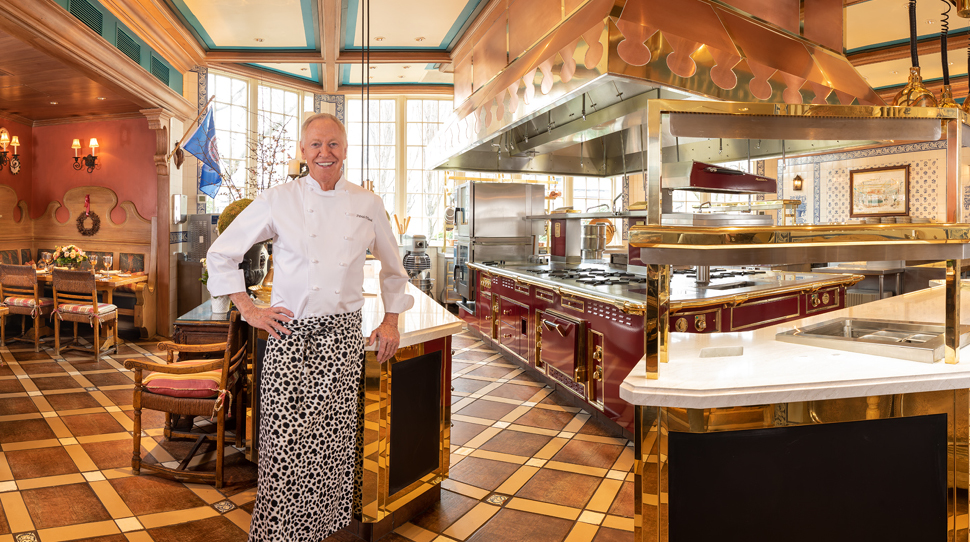

Want to talk pressure? Imagine making dinner for your boss every night. Now, imagine said boss being Patrick O’Connell, the world-renowned chef with a pantry full of accolades and the proprietor of longest-running double Forbes Travel Guide Five-Star for The Inn at Little Washington (it’s won every year since 1989) and its distinguished restaurant (a winner since 1991) of the same name. Our slotted spoons are shaking at the mere thought. But that’s exactly what the inn’s junior culinary staff does each evening to ensure a stellar dining experience for its patrons.
“They fret about it several days in advance,” says O’Connell, who has wined, dined and helped guests recline at his idyllic Virginia escape since 1978. “Sometimes I say, ‘Just keep it simple. Don’t overthink it.’”
Sometimes the toques get it right. Sometimes their dishes need tweaking. “I give them a critique, if they’re up for it,” he says. “I find that there are not enough editors in the world. There are not enough people giving the kinds of critiques young people need to develop in this field.”
But that’s how O’Connell has excelled in an industry with so much instability, with brutal truths, a bright team and brilliant, French-nodding tasting menus. And at 78, O’Connell shows no signs of slowing down. That may be unsettling news for aspiring chefs on dinner detail, but it’s exactly what folks who want to try imaginative dishes at a postcard-perfect property need to hear.
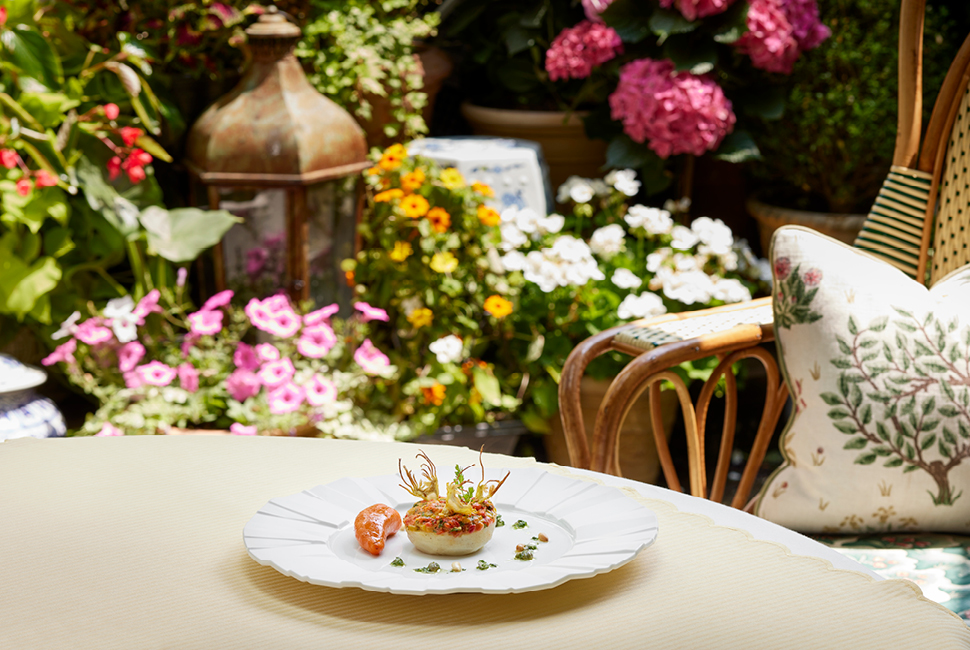
What did you have for lunch today?
We eat constantly. All I do is walk around the kitchen all day tasting. It’s just an automatic reflex. Food always excites me. I love food. I love squeezing the bread and smelling the flavors and [seeing] the visuals. You find that you sort of satisfy your senses differently than most people.
In the early days, I could never eat a meal that I could sit down to enjoy until midnight, when all the guests were gone. The work of a chef is very much like an athlete in certain ways, and we have to stay light, nimble and on our toes. If you actually eat a meal, you find that it weighs you down — especially when you have to keep your palate sharp. You’re looking for any imperfections, so you don’t ever want to be satiated. You always want to remain hungry.
You’ve been a Forbes Travel Guide award winner since the late ’80s. What are a few things you can point to for that consistency?
I think the misconception that many people have is that they interpret consistency as maintaining. That has never been the goal here. The goal has always been evolving and making it consistently better.
My theory is that, if I am a guest and I come here once a year, it has to be considerably better when I come this year than it was last year, or it’s not going to seem as good. Consistency is sort of a base level, and you have to go above it every year, every day, all of the time.
In the restaurant business, you don’t ever really arrive. You’re continually in the process of making something better, but there’s no end point to it, right? It’s a bit esoteric to say this, but I think like an artist. Your work has to represent who you are and where you are in your own personal evolution at any time.
I had a writing teacher who once said, “If you’re not embarrassed by what you wrote last year, you’re not progressing.” I simply try to stay embarrassed by everything we did just a week ago, because it won’t be good enough this week. It’s a difficult atmosphere to be part of because it’s continually challenging, but it’s incredibly rewarding to hear guests’ comments. And we have a very, very well-traveled audience of guests from all over the world who make a habit of going only to the top places. They continually use incredible superlatives in their comparisons. And we listen very carefully. And that’s when it is especially rewarding.
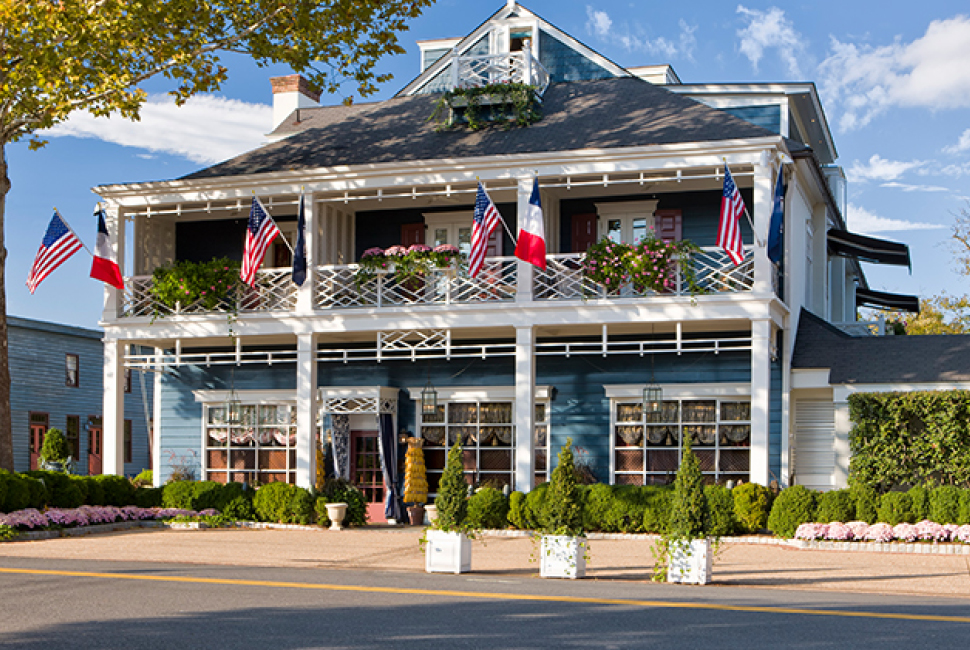
What I was able to do in the early days when we were in our primitive incarnation was gain my education by traveling for three weeks to a month in the off season in January, to what were the greatest restaurants in the world. Forty-six years ago, when we opened, America didn’t have places that resembled those great European destination places. That allowed me to create a reference point and sort of measure myself and my work against the greatest. Every year that process would continue, and I would work very hard all year.
And then, after about 20 years of measuring the gap between what I was doing here and what was going on in the great restaurants of Europe, the gap began to narrow. And then one day, even I could tell [the gap was gone]. And by the guests’ comments, I definitely knew there was no gap. We had finally elevated our cuisine and all of American cuisine to a level that it could hold its own against the greatest restaurants of Europe.
That was a wonderful moment and sense you felt that you had gone full circle. But then the world changed around us. The competition changes. You can’t ever stand still. I believe the old saying goes that a restaurant is either growing or dying — there’s nothing in between. I liken it to a garden that has to be constantly weeded, fertilized, maintained, nurtured, transplanted and loved.
What we add to the equation, to the experience that most places don’t focus on, is the art of dining as a kind of theatrical event. I continually critique the experience that we offer here through my lens as if I was the filmmaker. It helps identify the flaws, the off notes or the consistency with the film that we’re trying to create with the guests.
For the person who hasn’t stayed at The Inn at Little Washington, what are they missing?
We’re often told by guests that they feel, when they come here even if it’s for one or two nights, that they’ve gotten in a time machine and gone to a different era and a different culture. They say, “I thought I had to go to Europe to find an experience like this. I didn’t think it was available in America.”
During the pandemic, each night after we were able to reopen, I had guests telling us, “We were supposed to be in Italy. Tonight is our 25th anniversary. We were supposed to be in Scotland or France or whatever, but we couldn’t travel, and we came here. And guess what? We had a much better experience. And we didn’t have to fight airport [traffic] or exchange money.”
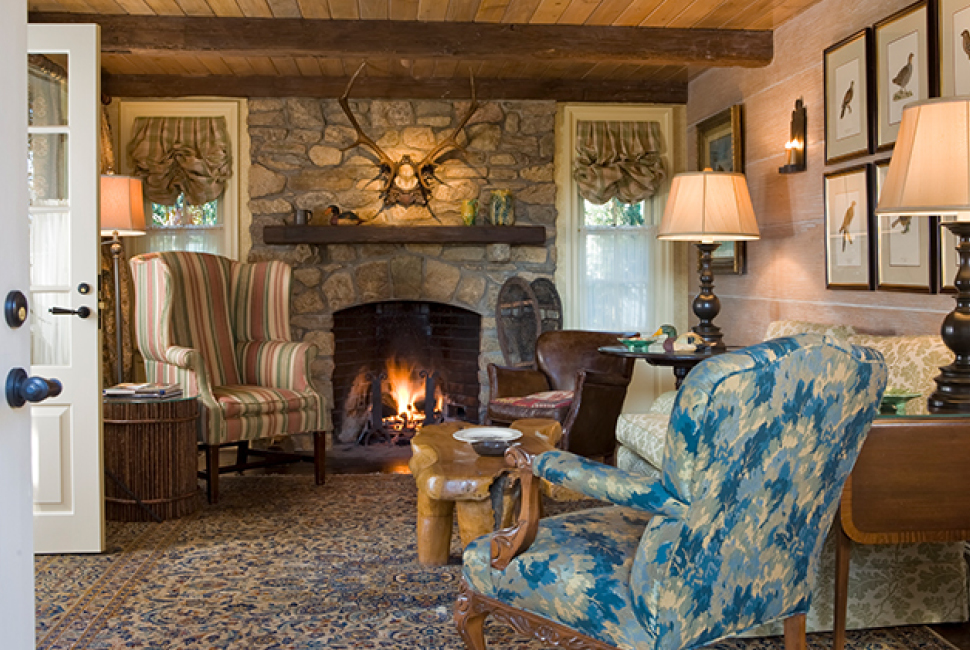
What [new visitors] will find is the feeling of being invited to a house party, a kind of experience that feels as if they’ve entered a movie in a different era. It’s a kind of a blissful state.
We began as a humble, simple, very small restaurant in the countryside. And it kept evolving. We added guest rooms, and the experience kept expanding and growing. Now, it’s a kind of healing sanctuary. People often don’t have cell reception here. They’re in a village in the mountains with a population of 100 people. You can imagine how tiny that is.
A good number of the inhabitants locally have never been to Washington, D.C., and most have no desire to go. As soon as you come out and take a deep breath of air, you are somewhere far, far away. Normally, that might be a camp out in the Blue Ridge Mountains or something. Here, you step inside, and you have a very luxurious hotel where everything is taken care of. Whatever you want is available to you. I like to say that we offer the experience of being a guest at a very fine country home of a different era, but with all the amenities of a Five-Star hotel in Paris or London.
You mentioned that, during your first 20 years in the business, you would travel to see where your culinary skills stacked with others. Do you get to travel much nowadays?
I make a point of trying to visit the places that my guests swoon over or compare us to. We’re part of an organization called Relais & Châteaux, a French-based group that now exists in 54 different nations. I was the president for 20 years of the North American delegation. Part of our assignment was to have at least four or five meetings a year in Europe or at a different chef’s property and be immersed in the culture of that region. I learned something every time I traveled.
I haven’t been able to be away for as long a period as I did in the early days because the inn is open year-round now. I just focus on the places where I think they may be doing something better than we are, or where I can learn something. Then you’re reminded that everyone who’s doing this has the same challenges that we do. We’re not alone. We’re not an island. It’s hard work to stay on top.
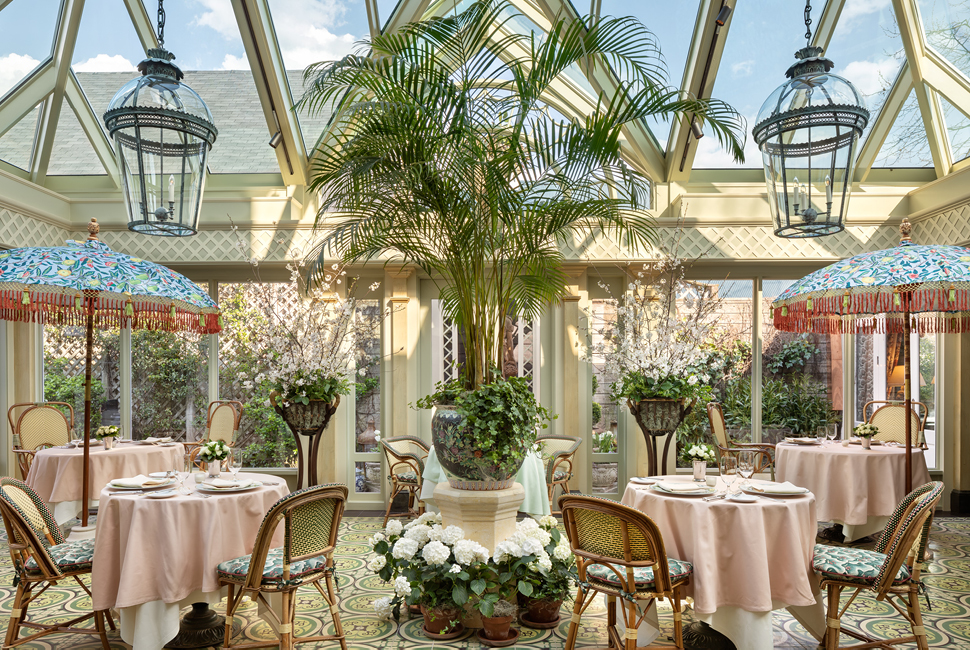
But you do get to bear the fruit of your labor in the form of accolades and praise from your guests?
Well, it is like a drug. You can be so tired sometimes you think that you can’t take another step. But someone may want to share with you how they feel about the experience. They’re very touched in a deep way. And then you have a burst of energy. It’s like adrenaline is funneled back into your veins and you’re ready to go again.
What else puts a smile on your face?
I’m a dreamer. Beauty inspires me. Beauty heals me. My last day off about three weeks ago, when the inn was closed, I went down to [Washington D.C.’s] National Gallery of Art. I walked in and I just smiled all over the space, the exhilaration of the art, the beautiful colors.
When I go to Europe, it’s the grand hotels, the monumental architecture. I love gardening. I love interiors. I never go to bed at night without opening one of my beautiful books on great English country houses, gardens or something like that. Naturally, I like Versailles. I love fantasy. I like reading cookbooks and studying beautiful food photography. But when I wake up here in the morning, I feel like I’m in the movie.
